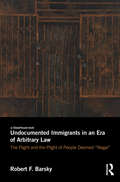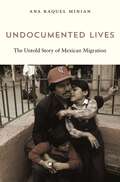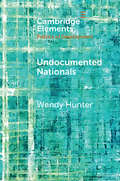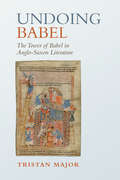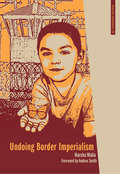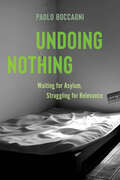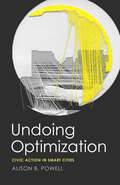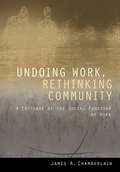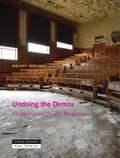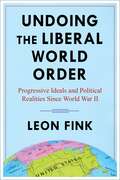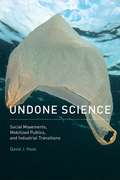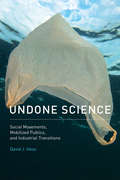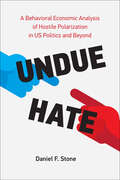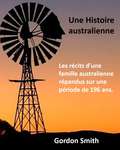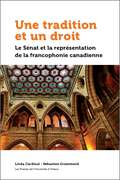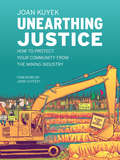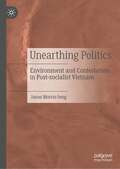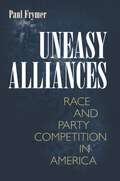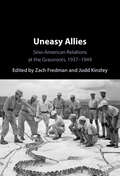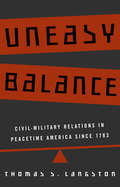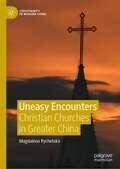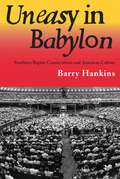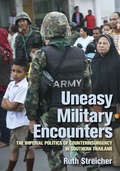- Table View
- List View
Undocumented Immigrants in an Era of Arbitrary Law: The Flight and the Plight of People Deemed 'Illegal'
by Robert F. BarskyThis book describes the experiences of undocumented migrants, all around the world, bringing to life the challenges they face from the moment they consider leaving their country of origin, until the time they are deported back to it. Drawing on a broad array of academic studies, including law, interpretation and translation studies, border studies, human rights, communication, critical discourse analysis and sociology, Robert Barsky argues that the arrays of actions that are taken against undocumented migrants are often arbitrary, and exercised by an array of officials who can and do exercise considerable discretion, both positive and negative. Employing insights from a decade-long research project, Barsky also finds that every stop along the migrant’s pathway into, and inside of, the host country is strewn with language issues, relating to intercultural communication, interpretation, gossip, hearsay, and the challenges of peddling of linguistic wares in the social discourse marketplace. These language issues are almost always impediments to anodyne or productive interactions with host country officials, particularly on the "front-lines" where migrants encounter border patrol and law enforcement officers without adequate means of communicating their situation or understanding their rights. Since undocumented people are categorized as ‘illegal’, they can be subjected to abuse and exploitation by host country officials, who can choose to either tolerate or punish them on the basis of unpredictable, changeable, and even illusory or "arbitrary" laws and regulations. Citing experts at every level of the undocumented immigrant apparatuses worldwide, from public defenders to interpreters, Barsky concludes that the only viable policy to address prevailing abuses and inequalities is to move towards open borders, an approach that would address prevailing issues and, surprisingly, provide security and economic benefits to both host and home countries.
Undocumented Lives: The Untold Story of Mexican Migration
by Ana Raquel MinianIn the 1970s the Mexican government acted to alleviate rural unemployment by supporting the migration of able-bodied men. Millions crossed into the United States to find work that would help them survive as well as sustain their families in Mexico. They took low-level positions that few Americans wanted and sent money back to communities that depended on their support. But as U.S. authorities pursued more aggressive anti-immigrant measures, migrants found themselves caught between the economic interests of competing governments. The fruits of their labor were needed in both places, and yet neither country made them feel welcome. Ana Raquel Minian explores this unique chapter in the history of Mexican migration. Undocumented Lives draws on private letters, songs, and oral testimony to recreate the experience of circular migration, which reshaped communities in the United States and Mexico. While migrants could earn for themselves and their families in the U.S., they needed to return to Mexico to reconnect with their homes periodically. Despite crossing the border many times, they managed to belong to communities on both sides of it. Ironically, the U.S. immigration crackdown of the mid-1980s disrupted these flows, forcing many migrants to remain north of the border permanently for fear of not being able to return to work. For them, the United States became known as the jaula de oro—the cage of gold. Undocumented Lives tells the story of Mexicans who have been used and abused by the broader economic and political policies of Mexico and the United States.
Undocumented Migrants and their Everyday Lives: The Case of Finland (IMISCOE Research Series)
by Jussi S. Jauhiainen Miriam TedeschiThis open access monograph provides an overview of the everyday lives of undocumented migrants, thereby focusing on housing, employment, social networks, healthcare, migration trajectories as well as their use of the internet and social media. Although the book’s empirical focus is Finland, the themes connect the latter to broader geographical scales, reaching from global migration issues to the EU asylum policies, including in the post-2015 situations and during the COVID-19 pandemic, as well as from national, political, and societal issues regarding undocumented migrants to the local challenges, opportunities, and practices in municipalities and communities. The book investigates how one becomes an undocumented migrant, sometimes by failing the asylum process. The book also discusses research ethics and provides practical guidelines and reflects on how to conduct quantitative, qualitative, and mixed methods research about undocumented migrants. Finally, the book addresses emerging research topics regarding undocumented migrants. Written in an accessible and engaging style the book is an interesting read for students, scholars, policymakers, and practitioners.
Undocumented Nationals: Between Statelessness and Citizenship (Elements in the Politics of Development)
by Wendy HunterUnderstood simply, people are either citizens of a country or stateless. Yet reality belies this dichotomy. Between absolute statelessness and full citizenship exist millions of people who are nationals of a country in principle but lack the identity documents to prove it, beginning with a birth certificate. Languishing in a gray zone, undocumented nationals have difficulty accessing the full services and rights that their documented counterparts enjoy. Drawing on a range of country examples, Undocumented Nationals: Between Statelessness and Citizenship calls attention to and analyzes the plight of people who cannot exercise full citizenship owing to evidentiary deficiencies. The existing literature has not adequately conceptualized and examined this in-between status, which results sometimes from state neglect and other times from intentional state discrimination. By highlighting its causes and consequences, and exploring ways to address the problem, this Cambridge Element addresses an important gap in the literature.
Undoing Babel: The Tower of Babel in Anglo-Saxon Literature (Toronto Anglo-Saxon Series)
by Tristan MajorThe Tower of Babel narrative is one of the most memorable accounts of the Bible, and its interpretative potential has produced a vast array of literary adaptations. Undoing Babel is the first extensive examination of the development of the Babel narrative amongst Anglo-Saxon authors from late antiquity to the eleventh century. Tristan Major’s illuminating and original insight into Anglo-Latin and Old English works, including the writings of Aldhelm, Bede, Alcuin, Ælfric, and Wulfstan, reveals the cultural ideologies and anxieties that transformed the Babel narrative. In doing so, Major argues that these Babel narratives provide a basis for understanding the world’s ethnic and linguistic diversity as well as a theological stimulus to evangelize non-Christian and non-European people. Undoing Babel highlights the depth of literary innovation in this period and disproves any notion of a single Anglo-Saxon reception of biblical sources.
Undoing Border Imperialism
by Andrea Smith Harsha Walia"Harsha Walia has played a central role in building some of North America's most innovative, diverse, and effective new movements. That this brilliant organizer and theorist has found time to share her wisdom in this book is a tremendous gift to us all."-Naomi Klein, author of The Shock DoctrineUndoing Border Imperialism combines academic discourse, lived experiences of displacement, and movement-based practices into an exciting new book. By reformulating immigrant rights movements within a transnational analysis of capitalism, labor exploitation, settler colonialism, state building, and racialized empire, it provides the alternative conceptual frameworks of border imperialism and decolonization. Drawing on the author's experiences in No One Is Illegal, this work offers relevant insights for all social movement organizers on effective strategies to overcome the barriers and borders within movements in order to cultivate fierce, loving, and sustainable communities of resistance striving toward liberation. The author grounds the book in collective vision, with short contributions from over twenty organizers and writers from across North America.Harsha Walia is a South Asian activist, writer, and popular educator rooted in emancipatory movements and communities for over a decade.Praise for Undoing Border Imperialism:"Border imperialism is an apt conceptualization for capturing the politics of massive displacement due to capitalist neoglobalization. Within the wealthy countries, Canada's No One Is Illegal is one of the most effective organizations of migrants and allies. Walia is an outstanding organizer who has done a lot of thinking and can write-not a common combination. Besides being brilliantly conceived and presented, this book is the first extended work on immigration that refuses to make First Nations sovereignty invisible."-Roxanne Dunbar Ortiz, author of Indians of the Americas and Blood on the Border"Harsha Walia's Undoing Border Imperialism demonstrates that geography has certainly not ended, and nor has the urge for people to stretch out our arms across borders to create our communities. One of the most rewarding things about this book is its capaciousness-astute insights that emerge out of careful organizing linked to the voices of a generation of strugglers, trying to find their own analysis to build their own movements to make this world our own. This is both a manual and a memoir, a guide to the world and a guide to the organizer's heart."-Vijay Prashad, author of The Darker Nations: A People's History of the Third World"This book belongs in every wannabe revolutionary's war backpack. I addictively jumped all over its contents: a radical mixtape of ancestral wisdoms to present-day grounded organizers theorizing about their own experiences. A must for me is Walia's decision to infuse this volume's fight against border imperialism, white supremacy, and empire with the vulnerability of her own personal narrative. This book is a breath of fresh air and offers an urgently needed movement-based praxis. Undoing Border Imperialism is too hot to be sitting on bookshelves; it will help make the revolution."-Ashanti Alston, Black Panther elder and former political prisoner
Undoing Nothing: Waiting for Asylum, Struggling for Relevance
by Paolo BoccagniA free ebook version of this title is available through Luminos, University of California Press's Open Access publishing program. Visit www.luminosoa.org to learn more. What does everyday life look like for young men who flee to Europe, survive, and are then assigned temporary housing? Hypersurveillance or parallel normality, irrelevance, or even nothingness? Based on four years of ethnographic research, Undoing Nothing recounts the untold story of Italian asylum seekers' struggles to produce relevance—that is, to carve out meaning, control, and direction from their legal and existential liminality. Their ways of inhabiting space and time rest on a deeply ambivalent position: together and alone, inside and outside, absent and present. Their racialized bodies dwell in their assigned residence while their selves inhabit a suspended translocal space of moral economies, nightmares, and furtive dreams. This book illuminates a distinctly modern form of purgatory, offering both a perceptive critique of state responses to the so-called refugee crisis and nuanced psychological portraits of a demographic rarely afforded narrative depth and grace.
Undoing Optimization: Civic Action in Smart Cities
by Alison B PowellA unique examination of the civic use, regulation, and politics of communication and data technologies City life has been reconfigured by our use—and our expectations—of communication, data, and sensing technologies. This book examines the civic use, regulation, and politics of these technologies, looking at how governments, planners, citizens, and activists expect them to enhance life in the city. Alison Powell argues that the de facto forms of citizenship that emerge in relation to these technologies represent sites of contention over how governance and civic power should operate. These become more significant in an increasingly urbanized and polarized world facing new struggles over local participation and engagement. The author moves past the usual discussion of top-down versus bottom-up civic action and instead explains how citizenship shifts in response to technological change and particularly in response to issues related to pervasive sensing, big data, and surveillance in &“smart cities.&”
Undoing Work, Rethinking Community: A Critique of the Social Function of Work
by James A. ChamberlainThis revolutionary book presents a new conception of community and the struggle against capitalism. In Undoing Work, Rethinking Community, James A. Chamberlain argues that paid work and the civic duty to perform it substantially undermines freedom and justice. Chamberlain believes that to seize back our time and transform our society, we must abandon the deep-seated view that community is constructed by work, whether paid or not. Chamberlain focuses on the regimes of flexibility and the unconditional basic income, arguing that while both offer prospects for greater freedom and justice, they also incur the risk of shoring up the work society rather than challenging it. To transform the work society, he shows that we must also reconfigure the place of paid work in our lives and rethink the meaning of community at a deeper level. Throughout, he speaks to a broad readership, and his focus on freedom and social justice will interest scholars and activists alike. Chamberlain offers a range of strategies that will allow us to uncouple our deepest human values from the notion that worth is generated only through labor.
Undoing the Demos, First Edition: Neoliberalism's Stealth Revolution (Zone / Near Futures Ser.)
by Wendy Brown<P>Wendy Brown explains how and why neoliberal reason undoes democracy - the political form and political imaginary it falsely promises to secure and reinvigorate. <P>Through meticulous analyses of neoliberalism law, political practices, governance, and education, she charts what has become the new common sense, arguing that for democracy to have a future, it must become an object of struggle and rethinking.
Undoing the Liberal World Order: Progressive Ideals and Political Realities Since World War II
by Leon FinkIn the decades following World War II, American liberals had a vision for the world. Their ambitions would not stop at the water’s edge: progressive internationalism, they believed, could help peoples everywhere achieve democracy, prosperity, and freedom. Chastened in part by the failures of these grand aspirations, in recent years liberals and the Left have retreated from such idealism. Today, as a beleaguered United States confronts a series of crises, does the postwar liberal tradition offer any useful lessons for American engagement with the world?The historian Leon Fink examines key cases of progressive influence on postwar U.S. foreign policy, tracing the tension between liberal aspirations and the political realities that stymie them. From the reconstruction of post-Nazi West Germany to the struggle against apartheid, he shows how American liberals joined global allies in pursuit of an expansive political, social, and economic vision. Even as liberal internationalism brought such successes to the world, it also stumbled against domestic politics or was blind to the contradictions in capitalist development and the power of competing nationalist identities. A diplomatic history that emphasizes the roles of social class, labor movements, race, and grassroots activism, Undoing the Liberal World Order suggests new directions for a progressive American foreign policy.
Undone Science: Social Movements, Mobilized Publics, and Industrial Transitions
by David J. HessAs the fields of social movement studies (SMS) and science and technology studies (STS) have diversified in topical focus, they have moved closer to each other. SMS has turned toward the study of nonstate targets and institutionalized repertoires of action, just as STS has turned to expertise and publics. In Undone Science, David Hess argues that a theoretical integration of core concepts in the two fields is now possible, and he presents just such a synthesis. Hess focuses on industrial transition movements -- mobilized counterpublics of activists, advocates, entrepreneurs, and other agents of change -- and examines several areas of common ground between the two fields relevant to these movements. His account reveals the problem of "undone science" -- areas of research potentially valuable to the goals of industrial transition movements that have been systematically ignored. Each chapter begins with a problem in SMS, discusses the relevant STS literature, describes new concepts and findings that have emerged, and offers applications to examples that range from nanotechnology and climate science denialism to conflicts based on race, class, and gender. Topics include the epistemic dimension of the political opportunity structure, networks of counterpublic knowledge, and regime resistance in industrial transition.
Undone Science: Social Movements, Mobilized Publics, and Industrial Transitions (The\mit Press Ser.)
by David J. HessA theoretical integration of science and technology studies and social movement studies that finds both common ground and “undone” research.As the fields of social movement studies (SMS) and science and technology studies (STS) have diversified in topical focus, they have moved closer to each other. SMS has turned toward the study of nonstate targets and institutionalized repertoires of action, just as STS has turned to expertise and publics. In Undone Science, David Hess argues that a theoretical integration of core concepts in the two fields is now possible, and he presents just such a synthesis. Hess focuses on industrial transition movements—mobilized counterpublics of activists, advocates, entrepreneurs, and other agents of change—and examines several areas of common ground between the two fields relevant to these movements. His account reveals the problem of “undone science”—areas of research potentially valuable to the goals of industrial transition movements that have been systematically ignored. Each chapter begins with a problem in SMS, discusses the relevant STS literature, describes new concepts and findings that have emerged, and offers applications to examples that range from nanotechnology and climate science denialism to conflicts based on race, class, and gender. Topics include the epistemic dimension of the political opportunity structure, networks of counterpublic knowledge, and regime resistance in industrial transition.
Undue Hate: A Behavioral Economic Analysis of Hostile Polarization in US Politics and Beyond
by Daniel F. StoneHow to understand the mistakes we make about those on the other side of the political spectrum—and how they drive the affective polarization that is tearing us apart.It&’s well known that the political divide in the United States—particularly between Democrats and Republicans—has grown to alarming levels in recent decades. Affective polarization—emotional polarization, or the hostility between the parties—has reached an unprecedented fever pitch. In Undue Hate, Daniel F. Stone tackles the biases undergirding affective polarization head-on. Stone explains why we often develop objectively false, and overly negative, beliefs about the other side—causing us to dislike them more than we should.Approaching affective polarization through the lens of behavioral economics, Undue Hate is unique in its use of simple mathematical concepts and models to illustrate how we misjudge those we disagree with, for both political and nonpolitical issues. Stone argues that while our biases may vary, just about all of us unwisely exacerbate conflict at times—managing to make ourselves worse off in the long run. Finally, the book offers both short- and long-term solutions for tempering our bias and limiting its negative consequences—and, just maybe, finding a way back to understanding one another before it is too late.
Undue Process: Persecution and Punishment in Autocratic Courts (Cambridge Studies in Law and Society)
by Fiona Feiang Shen-BayhWhy do autocrats hold political trials when outcomes are presumed known from the start? Undue Process examines how autocrats weaponize the judiciary to stay in control. Contrary to conventional wisdom that courts constrain arbitrary power, Shen-Bayh argues that judicial processes can instead be used to legitimize dictatorship and dissuade dissent when power is contested. Focusing on sub-Saharan Africa since independence, Shen-Bayh draws on fine-grained archival data on regime threats and state repression to explain why political trials are often political purges in disguise, providing legal cover for the persecution of regime rivals. This compelling analysis reveals how courts can be used to repress political challengers, institutionalize punishment, and undermine the rule of law. Engaging and illuminating, Undue Process provides new theoretical insights into autocratic judiciaries and will interest political scientists and scholars studying authoritarian regimes, African politics, and political control.
Une Histoire australienne: Les Histoires D'une Famille Australienne Répartis Sur Une Période De 196 Ans
by Gordon SmithLes récits d’une famille australienne répandus sur une période de 196 ans. Si quelqu’un aime connaître l’histoire contemporaine de l’Australie, ce livre lui présenterait bien des scènes touchantes à ce propos. C’est l’histoire d’une grande famille dès leurs premiers jours d’installation en Australie jusqu’à la fin du vingtième siècle. De Sydney à Melbourne, d’Adelaide à Darween et de Brisbane à Perth, vous lirez les aventures émouvantes de tous les membre de cette famille. C’est également l’histoire des première et seconde guerres mondiales, les atrocités de la guerre et la misère des victimes innocentes qui vous feront du mal mais vous donneront un aperçu de ce qui s’est passé en Australie, bien avant la première guerre mondiale et longtemps après. Ce roman historique vous parle aussi d’amour et de progrès technique aux temps moderne.
Une tradition et un droit: Le Sénat et la représentation de la francophonie canadienne (Politique et politiques publiques)
by Linda Cardinal Sébastien GrammondCet ouvrage montre de façon éloquente le rôle du Sénat dans la représentation politique des communautés francophones et acadienne du Canada (CFC). Les CFC ont droit à une représentation au Sénat qui découle d’une convention constitutionnelle et leur représentation politique ne doit pas être négligée par les administrations politiques.Dans le droit fil de la tradition parlementaire britannique, le système politique canadien repose non seulement sur des règles de droit écrit, mais aussi sur un ensemble de conventions. Même si ces conventions ne sont pas nécessairement justiciables, en ce sens qu’il n’appartient pas aux tribunaux de les faire respecter, elles sont dotées d’une force normative considérable.Rédigé par Linda Cardinal et Sébastien Grammond, spécialistes des questions linguistiques et identitaires, du constitutionnalisme, du fédéralisme et de la représentation des minorités au sein des institutions politiques, cet ouvrage est le fruit de leurs interventions portant sur les réformes du Sénat proposées par le gouvernement Harper depuis 2006. Ces réformes n’étaient pas favorables à la représentation des CFC et négligeaient le fait qu’il existe une convention ou un droit à la représentation des CFC au Sénat.L’ouvrage revient sur cette période et évalue les scénarios de réforme en s’appuyant sur les débats internationaux sur la représentation politique des minorités. Ces analyses sont importantes, car elles précisent les mécanismes les plus susceptibles de favoriser la représentation des minorités au sein des institutions gouvernementales. Un rappel en règle que la question de la représentation politique des CFC ne peut pas être escamotée par les gouvernements au pouvoir. Publié en français
Unearthing Justice: How to Protect Your Community from the Mining Industry
by Joan KuyekThe mining industry continues to be at the forefront of colonial dispossession around the world. It controls information about its intrinsic costs and benefits, propagates myths about its contribution to the economy, shapes government policy and regulation, and deals ruthlessly with its opponents. Brimming with case studies, anecdotes, resources, and illustrations, Unearthing Justice exposes the mining process and its externalized impacts on the environment, Indigenous Peoples, communities, workers, and governments. But, most importantly, the book shows how people are fighting back. Whether it is to stop a mine before it starts, to get an abandoned mine cleaned up, to change laws and policy, or to mount a campaign to influence investors, Unearthing Justice is an essential handbook for anyone trying to protect the places and people they love.
Unearthing Politics: Environment and Contestation in Post-socialist Vietnam
by Jason Morris-JungThis book examines an important socio-political challenge to the ruling party regime in Vietnam. Vietnam has been the subject of substantial controversy and challenge to the Vietnamese party regime since market reform in the 1980s, especially since the controversy over bauxite mining in the late 2000. Using the environmental dimensions of this problem to highlight a confluence of trends disrupting the nation’s “encrusted politics”, this book open up a space for the in-depth study of the most sensitive issues, bravest activists, and most off limit struggles with the party-state in Vietnam today.
Uneasy Alliances: Race and Party Competition in America (Princeton Studies in American Politics: Historical, International, and Comparative Perspectives #116)
by Paul FrymerUneasy Alliances is a powerful challenge to how we think about the relationship between race, political parties, and American democracy. While scholars frequently claim that the need to win elections makes government officials responsive to any and all voters, Paul Frymer shows that not all groups are treated equally; politicians spend most of their time and resources on white swing voters--to the detriment of the African American community. As both parties try to attract white swing voters by distancing themselves from blacks, black voters are often ignored and left with unappealing alternatives. African Americans are thus the leading example of a "captured minority." Frymer argues that our two-party system bears much of the blame for this state of affairs. Often overlooked in current discussions of racial politics, the party system represents a genuine form of institutional racism. Frymer shows that this is no accident, for the party system was set up in part to keep African American concerns off the political agenda. Today, the party system continues to restrict the political opportunities of African American voters, as was shown most recently when Bill Clinton took pains to distance himself from African Americans in order to capture conservative votes and win the presidency. Frymer compares the position of black voters with other social groups--gays and lesbians and the Christian right, for example--who have recently found themselves similarly "captured." Rigorously argued and researched, Uneasy Alliances is a powerful challenge to how we think about the relationship between black voters, political parties, and American democracy. In a new afterword, Frymer examines the impact of Barack Obama's election on the delicate relationship between race and party politics in America.
Uneasy Allies: Sino-American Relations at the Grassroots, 1937–1949
by Judd C. Kinzley Zach FredmanThis timely collection of essays examines Sino-American relations during the Second World War, the Chinese Civil War and the opening of the Cold War. Drawing on new sources uncovered in China, Taiwan, the UK and the US, the authors demonstrate how 'grassroots' engagements - not just elite diplomacy - established the trans-Pacific networks that both shaped the postwar order in Asia, and continue to influence Sino-US relations today. In these crucial years, servicemen, scientists, students, businesspeople, activists, bureaucrats and many others travelled between the US and China. In every chapter, this innovative volume's approach uncovers their stories using both Chinese and English language sources. By examining interactions among various Chinese and American actors in the dynamic wartime environment, Uneasy Allies reveals a new perspective on the foundations of American power, the brittle nature of the Sino-American relationship, and the early formation of the institutions that shaped the Cold War Pacific.
Uneasy Balance: Civil-Military Relations in Peacetime America since 1783
by Thomas S. LangstonIn the first book to focus on civil-military tensions after American wars, Thomas Langston challenges conventional theory by arguing that neither civilian nor military elites deserve victory in this perennial struggle. What is needed instead, he concludes, is balance.In America's worst postwar episodes, those that followed the Civil War and the Vietnam War, balance was conspicuously absent. In the late 1860s and into the 1870s, the military became the tool of a divisive partisan program. As a result, when Reconstruction ended, so did popular support of the military. After the Vietnam War, military leaders were too successful in defending their institution against civilian commanders, leading some observers to declare a crisis in civil-military relations even before Bill Clinton became commander-in-chief.Is American military policy balanced today? No, but it may well be headed in that direction. At the end of the 1990s there was still no clear direction in military policy. The officer corps stubbornly clung to a Cold War force structure. A civilian-minded commander-in-chief, meanwhile, stretched a shrinking force across the globe. With the shocking events of September 11, 2001, clarifying the seriousness of the post-Cold War military policy, we may at last be moving toward a true realignment of civilian and military imperatives.
Uneasy Encounters: Christian Churches in Greater China (Christianity in Modern China)
by Magdaléna RychetskáThe book examines the dynamic processes of the various social, political, and cultural negotiations that representatives of Christian groups engage in within authoritarian societies in Greater China, where Christianity is deemed a foreign religious system brought to China by colonial rulers. The book explores the political and social cooperation and negotiations of two particular Christian groups in their respective and distinct settings: the open sector of the Catholic Church in the communist People’s Republic on mainland China from 1945 to the present day, and the Presbyterian church of Taiwan in the Republic of China in Taiwan during the period of martial law from 1949 to 1987. Rather than simply confirm the ‘domination-resistance’ model of church–state relations, the book focuses on the various approaches adopted by religious groups during the process of negotiation. In an authoritative Chinese environment, religious specialists face two related pressures: the demands of their authoritarian rulers and social pressure requiring them to assimilate to the local culture. The book uses two case studies to support a wider theory of economic approach to religion.
Uneasy In Babylon: Southern Baptist Conservatives And American Culture (Religion And American Culture Ser.)
by Barry HankinsThe first book-length interpretation of the new conservative leaders of America's largest Protestant denomination Uneasy in Babylon is based on extensive interviews with the most important Southern Baptist conservatives who have assumed control of the Southern Baptist Convention (SBC). Known to many Americans from their appearances on national TV talk shows, such as Larry King Live and Fox News, they advocate a return to traditional values throughout the country. Hankins shows how differing cultural perceptions help explain the great chasm that developed between fundamentalists in the SBC and the moderates who preceded them as leaders of the denomination.
Uneasy Military Encounters: The Imperial Politics of Counterinsurgency in Southern Thailand
by Ruth StreicherUneasy Military Encounters presents a historically and theoretically grounded political ethnography of the Thai military's counterinsurgency practices in the southern borderland, home to the greater part of the Malay-Muslim minority. Ruth Streicher argues that counterinsurgency practices mark the southern population as the racialized, religious, and gendered other of the Thai, which contributes to producing Thailand as an imperial formation: a state formation based on essentialized difference between the Thai and their others. Through a genealogical approach, Uneasy Military Encounters addresses broad conceptual questions of imperial politics in a non-Western context: How can we understand imperial policing in a country that was never colonized? How is "Islam" constructed in a state that is officially secular and promotes Buddhist tolerance? What are the (historical) dynamics of imperial patriarchy in a context internationally known for its gender pluralism? The resulting ethnography excavates the imperial politics of concrete encounters between the military and the southern population in the ongoing conflict in southern Thailand.
